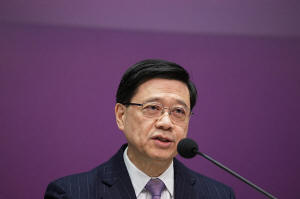Hong Kong leader starts push for new security laws, says city 'can't
afford to wait'
 Send a link to a friend
Send a link to a friend
 [January 30, 2024]
By Jessie Pang and Greg Torode [January 30, 2024]
By Jessie Pang and Greg Torode
HONG KONG (Reuters) -Hong Kong's leader confirmed on Tuesday his
intention to tighten national security laws to build on sweeping
legislation China imposed in 2020, saying the city "could not afford to
wait".
Some business people, diplomats and academics are watching developments
closely, saying the prospect of new laws targeting espionage, state
secrets and foreign influence, known as Article 23, could have a deep
impact on the global financial hub.
Critics have denounced the 2020 legislation as a clampdown on dissent in
the former British colony. The Chinese and Hong Kong governments say it
was needed to restore stability after sometimes violent pro-democracy
protests that swept the territory a year earlier.
Chief Executive John Lee said the government will attempt to pass the
laws "as soon as possible" but did not give a precise timetable for them
to be approved by the city's legislature.
"Why now? We can't wait. I've said it very clearly. We can't afford to
wait. It's for 26 years we've been waiting. We shouldn't wait any
longer," Lee said, describing it as the city's constitutional
responsibility dating back to its 1997 handover to China from British
rule.
"While we, society as a whole, look calm and look very safe, we still
have to watch out for potential sabotage, undercurrents that try to
create troubles," he said, saying some foreign agents could still be
active in Hong Kong.

Lee said the city's freedoms would be safeguarded and the laws would
meet international standards.
A 110-page consultation document was sent to the Legislative Council on
Tuesday and the consultation will end on Feb. 28.
The document outlines the need for new and updated laws covering the
theft of state secrets, espionage, treason, sedition and sabotage,
including the use of computers and electronic systems to conduct actions
endangering national security.
Tighter control of foreign and Taiwanese political organizations linked
to the city is also advocated under proposals for a new offence of
"external interference".
"External forces" had been using the city "as a bridgehead for
anti-China activities...and propagating anti-China ideology through a
soft approach to demonize" the Chinese and Hong Kong governments. It
noted "monitoring of human rights" as one of the "guises".
The consultation document warns that Hong Kong is under increasing
threat from foreign espionage and intelligence operations, and cites the
2019 protests.

China and Hong Kong are "unavoidably subject to acts and activities
endangering national security conducted by the agents or spies of
external forces (including external political organizations or
intelligence agencies)" in the city, it notes.
[to top of second column]
|

Hong Kong Chief Executive John Lee attends a press conference
regarding the legislation of Article 23 national security laws, in
Hong Kong, China January 30, 2024. REUTERS/Lam Yik

It defines a list of state secrets in Hong Kong, including economic,
scientific and diplomatic information, but says that for something
to be classed as a state secret it would have to endanger national
security if released.
SHARPER LAWS
While Chinese and Hong Kong government officials said the 2020 law
was vital to restoring stability, the new package has long been
required under Hong Kong's mini-constitution, known as the Basic
Law.
That document guides the city's relationship with its Chinese
sovereign after 1997, and Article 23 stipulates that the city "shall
enact laws on its own to prohibit acts and activities that endanger
national security".
Some legal scholars say the new, local legislation could sharpen the
at times vaguely worded 2020 law, and older colonial-era laws
considered unworkable.
"It almost certainly will set red lines where the existing laws are
vague, particularly in defining state secrets and espionage,” said
Simon Young, a professor at the University of Hong Kong's law
school.
For example, the colonial-era espionage law refers to an "enemy" - a
term the document describes as too restrictive, preferring to expand
the law to cover peacetime "external forces" as well, including
foreign governments, organizations and individuals.
It also calls for consideration of ending early paroles when
offences involve national security.
Lee said repeatedly that he believed the new laws would create a
more stable and safe city and ultimately serve the interests of
individuals, businesses and private organizations.
"Our legislation, of course, is subject to scrutiny by both Hong
Kong people....and international people," he said.
"We are confident, we are proud, and we stand high because the
principles we adopt conform with the international standard."
The document cites similar laws in Britain, the United States,
Australia, Canada, New Zealand and Singapore.
A previous government attempt to pass Article 23 was shelved after
an estimated 500,000 people staged a peaceful protest in 2003,
forcing the resignation of the then security minister.
But the staging of such protests is now a thing of the past, a
traditional venting of opinion curbed by the enforcement and
provisions of the 2020 legislation.
(Reporting by Greg Torode and Jessie Pang; Editing by Anne Marie
Roantree, Christian Schmollinger, Michael Perry and Nick Macfie)
[© 2024 Thomson Reuters. All rights reserved.]This material
may not be published, broadcast, rewritten or redistributed.
Thompson Reuters is solely responsible for this content. |